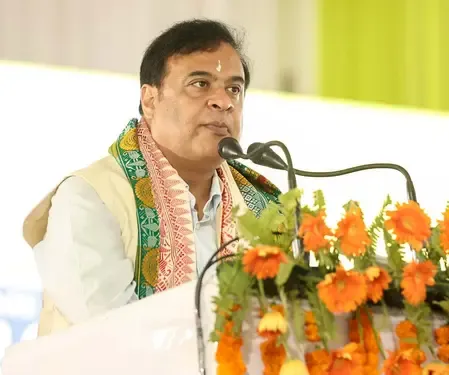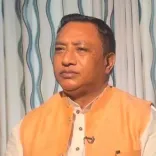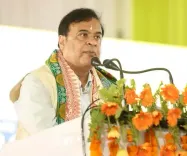Is Assam Facing a Demographic Threat Amid Land Encroachment?

Synopsis
Assam's Chief Minister, Himanta Biswa Sarma, has raised alarms over the potential demographic shifts impacting the state's social fabric, while emphasizing the government's robust actions against land encroachment. This initiative aims to reclaim government land and restore stability. His remarks highlight the delicate balance between demographic changes and political integrity.
Key Takeaways
- Assam's government is actively reclaiming encroached land.
- Demographic shifts are causing political concerns.
- Communal respect is essential for stability.
- Engagement with minority leaders is ongoing.
- Long-term solutions may take a decade or longer.
Guwahati, June 8 (NationPress) The Chief Minister of Assam, Himanta Biswa Sarma, has reiterated his administration’s resolve to confront the significant challenge of land encroachment, labeling the ongoing initiative as monumental in scope.
Addressing the media on Saturday, Sarma expressed anxiety over a “politically motivated demographic transformation” that he perceives as jeopardizing the state’s social balance. He shared insights into the considerable measures undertaken over the past four years to recover government land, asserting that a vast campaign against encroachment has been in progress, yielding notable success.
“Over the last four years, we have engaged in a thorough campaign to reclaim government land, and this endeavor will persist,” he stated. The Chief Minister mentioned that eviction efforts have been executed throughout all districts, with most reclaimed territories remaining devoid of new encroachments.
However, Sarma pointed out that achieving enduring outcomes may require a decade or more. “Merely issuing a notice is insufficient,” he remarked, highlighting the intricacies of the challenge.
During a visit to East Goalpara, Sarma drew attention to the shifting demographic patterns in the area, observing changes in the population dynamics in several regions. “Historically, Hindus were the majority in Goalpara. However, now, from Baghbar to Nadibhanga, approximately 20,000 to 25,000 individuals have migrated, resulting in Hindus becoming the minority in the constituency,” he noted. The Chief Minister also mentioned the manipulation of voter registrations, which he believes intensifies the region’s political instability.
“Individuals even alter their voter registrations. If they had retained them in Baghbar, the scenario would have been different,” Sarma explained. He stressed the necessity of communal respect, warning that unchecked land occupation could lead to instability. “If we fail to demonstrate mutual respect, and if individuals think they can just take land, the social fabric of Assam will deteriorate,” Sarma cautioned.
He further advocated for regional stability, proposing that people should stay in their home areas to alleviate tensions. “If residents from Baghbar remain in Baghbar, Jania in Jania, and Nalbari in Nalbari, numerous issues would be resolved,” he added. Sarma disclosed that he has been consistently engaging with minority leaders to promote understanding and uphold peace.
“I continuously strive to communicate these concerns to minority leaders. We must comprehend each other’s challenges to prevent chaos and maintain peace,” he stated.
This initiative highlights the administration's broader efforts to address the consequences of demographic changes on governance and social harmony.
Sarma characterized land encroachment as a “troublesome and harmful process,” warning of a perilous cycle where land is first seized, followed by renting homes, and ultimately leading to alterations in voter identities. “This cycle poses a threat. It’s a dangerous path that endangers our social and political stability,” he asserted.
The Chief Minister’s statements arrive at a time when issues surrounding land rights, voter integrity, and communal harmony are politically sensitive and contentious in Assam.









